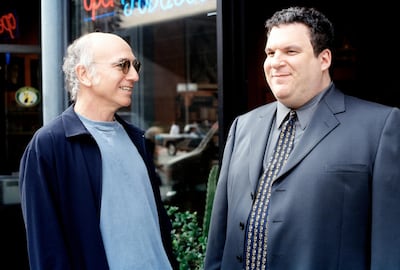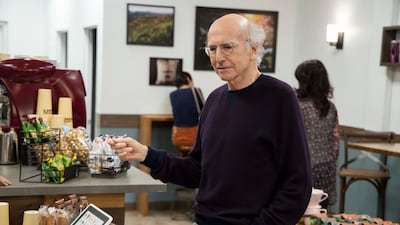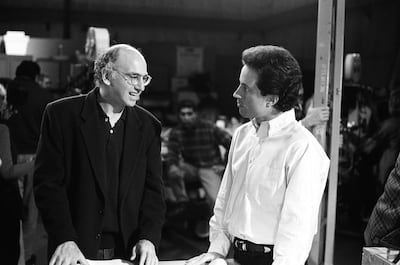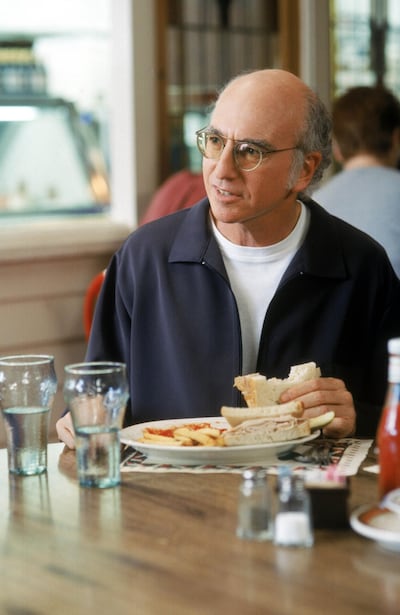When the first season of Curb Your Enthusiasm made its debut back in October 2000, Larry David would have firmly believed that its ten episodes would also be its last. David had been well documented as declaring that he was all out of ideas and had nothing else to write about.
The co-creator and showrunner of Seinfeld quit the sitcom so often, before always reconsidering and returning, that it became a running joke on set that he'd announce his resignation at the end of each season. David did eventually live up to his word, though, when he left Seinfeld for good after its seventh season (returning only for the final episode).
Which makes it all the more surprising then that today, David will return for the tenth season of Curb Your Enthusiasm. Very little is known about the specifics of the episodes, but it will most certainly feature the exaggerated version of David getting into minor and major confrontations because of the way he acts during social interactions.
That's exactly what we've come to expect from David and the show's incredible comedic ensemble, which has long included Susie Essman, Jeff Garlin, Cheryl Hines, Richard Lewis, J B Smoove, and Ted Danson. Season 10 will also continue the show's longline of impressive guest stars, with appearances by Jon Hamm, Jane Krakowski, Isla Fisher, Fred Armisen, Laverne Cox and Jeff Tweedy already confirmed.
At this point, David could pretty much get anyone he wants to appear on Curb Your Enthusiasm, such is the success and impact of the show. Not only has pretty much every season drawn acclaim, but over the course of the past 20 years, it has genuinely changed the comedic landscape, too.
The most obvious influence that the show has had on pop culture is the way that it popularised improvisation. While David outlines each episode and season, and even comes up with key points for each scene, the fact that all of the dialogue is made up on the spot by him and his co-stars was one of the original attractions of the show.
Since then, writer and director Judd Apatow has mirrored this approach for key scenes in The 40-Year-Old Virgin, Knocked Up and This is Forty, as has Paul Feig on Bridesmaids, while director Michael Winterbottom asked Steve Coogan and Rob Brydon to riff and ad-lib most of the dialogue on all three seasons of The Trip, too.
The comparisons between the British comedy and Curb Your Enthusiasm don't end there. David's decision to play an embellished version of himself paved the way for many others to do so, with Coogan and Brydon heightening their own public personas on The Trip, including their own perceived friendship, to such an extent that now most viewers don't know which parts of their personalities are real.

The technique caught on so much that it has been picked up by hugely successful and established thespians. Keanu Reeves seemingly did it in Always Be My Maybe, Bill Murray in Zombieland, Matt Le Blanc in Episodes, Marc Maron in Maron, the guest stars in Extras and Entourage, and the entire cast of This is the End were also emboldened to do so, thanks, we assume, to David.
It's not just in front of the camera that David's impact was felt, though. As the creator, producer, writer and star of Curb Your Enthusiasm, the power that the creative all-rounder wielded had suddenly made everyone want to become an auteur on the small-screen.
Although Jerry Seinfeld and Garry Shandling were just as versatile on their shows in the 1990s, David did so with such grandeur and honesty that we watched shades of Curb Your Enthusiasm appear in various other television shows in years to come – including Donald Glover's Atlanta, Pamela Adlon's Better Things and Aziz Ansari in Master Of None.
Curb Your Enthusiasm's biggest impact, though, was making misanthropy mainstream. Since David's show, It's Always Sunny In Philadelphia, Broad City, The Inbetweeners and Peep Show, as well as Ricky Gervais's entire post-Office career and persona, are just some of the shows to have meticulously explored the minutiae of real-life and the furious anger that interacting with others can provoke.
But none of them has managed to eclipse Curb Your Enthusiasm's funniest moments. Whether it was David declaring his hatred for the Happy Birthday song, reburying his mother, or accusing Michael J Fox of using his Parkinson's disease as an excuse for being a bad neighbour, the fact that Larry has the bravado to say what he's thinking with such stubbornness and passion has always meant that audiences couldn't help but root for him – even when they disagreed entirely with his actions.
David could only have done this on HBO, which has given him the freedom to explore his hilariously twisted thoughts on religion, gender and relationships in any way he desired, without ever being censored. Let's hope that they continue to give him free rein for many more years to come, too. Because even if at the moment he thinks he has absolutely no interest in returning, David clearly can't stop himself from setting the world to rights.



